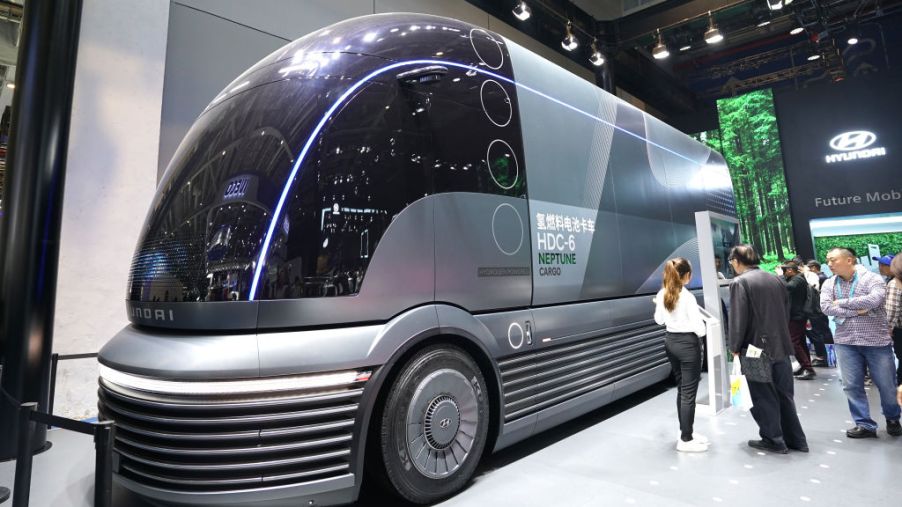
Is This Hyundai Semi-Truck the Future of the Commercial Trucking Industry?
More technology is used in today’s vehicles than ever before. But automakers are always looking toward the future, investing in technologies that could revolutionize the way the world sees automobiles. And Hyundai’s latest hydrogen fuel cell semi-truck could prove to be the biggest game-changer in commercial truck history.
Hyundai’s semi-truck of the future
According to Motor 1, Hyundai made its first fuel cell electric vehicle (FCEV) back in 2013. But the South Korean automaker has been developing that technology ever since, investing an estimated $6.4 billion into the project. And in those few short years, Hyundai has been working hard on revolutionary designs. Recently, Hyundai unveiled its newest concept for a semi-truck that could revolutionize the commercial trucking industry.
The Hyundai HDC-6 Neptune is “a hydrogen-powered fuel cell electric semi-truck and refrigerated trailer” that looks like something from a futuristic comic book. The HDC-6 Neptune is a Class 8 truck that’s loaded to the brim with the latest technology and modern aesthetics. All this makes it look more like a railway train from the mid-20th century rather than a cargo-hauling semi-truck.
One of the most prominent features is its excessively-large grille, needed for optimal cooling. The grille extends around the lower portion of the cab, hiding secret steps to enter it. The HDC-6 uses in-cab technology and a unique propulsion system to provide long driving ranges at near-zero-emissions.
There are cameras instead of side-view mirrors, no door handles, and room for up to eight hydrogen tanks. Though the HDC-6 Neptune isn’t there yet, Hyundai plans for it to have a large enough cell stack to haul 80,000 lbs or more.
Attached to the rear of the HDC-6 Neptune is a new refrigerated trailer dubbed the HT Nitro ThermoTech. It is made from a new structural design that makes it lighter and stronger.
According to PR Newswire, the HT Nitro ThermoTech trailer was designed by the leading trailer manufacturer, Hyundai Translead. The trailer will even keep cargo cold after the truck’s engine is turned off, using independent cooling power and an intelligent control system.
The benefits of a hydrogen-powered semi-truck
The HDC-6 Neptune and its trailer have obvious implications for environmental benefits. According to Business Insider, the cryogenic nitrogen refrigeration technology used in the trailer produces 90% less of a carbon footprint than traditional trailers.
The same system reduces noise pollution, as the system is naturally noiseless. When combined with hydrogen-based technology, the HDC-6 Neptune could provide a response to the growing problem of “clean” transportation.
With the development of the HDC-6 Neptune, Hyundai has also announced that it is interested in exploring opportunities within the U.S. commercial vehicle market. This hydrogen-powered semi could indicate a serious change in the business of transporting goods.
Fuel cells are ideal for semi-trucks and extended driving distances, due to their naturally-higher driving range, minimal refueling times, high payload capacity, and lower overall costs. Combined with its environmental implications, fuel-cell-powered commercial vehicles could create an entirely new solution to a variety of problems.
Challenges Hyundai faces with its new truck
Hyundai has grand plans for its fuel cell technology projects. Its FCEV Vision 2030 is based on the goal of building at least 500,000 FCEVs per year by 2030, but its commercial vehicles are already sold in more than 100 countries.
According to Trucks.com, this technology is still young and therefore limited in availability in the U.S. But with this new vision, Hyundai plans to change that. While Hyundai is invested in accelerating its hydrogen fuel cell development, it still faces the same problems with infrastructure, logistics, and finance that every other automaker is facing.


